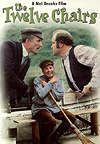The Twelve Chairs (1970)
Image Entertainment
Cast: Ron Moody, Frank Langella, Dom DeLuise, Mel Brooks
Extras: Theatrical Trailer
Rating:
Satisfying as well as infuriating, the movies of Mel Brooks invariably swing between affectionate parody ("Young Frankenstein") and vulgar spoofs ("Blazing Saddles"). Yet he is not afraid to sprinkle in commentary about the human condition ("Life Stinks") or even tackle the monsters of our world through out-and-out mockery ("The Producers"). Unique amongst the aforementioned categories is "The Twelve Chairs," Brooks’ sometimes goofy, sometimes bleak examination about life after the Russian Revolution and one man’s journey towards making peace with his place in a brave new world. Thanks to Image Entertainment’s new DVD presentation, we can come along for the ride.
Based on a novel by two Russian journalists, Brooks’ adaptation is a mixed but pleasing bag of farce, slapstick and social critique. Playing out like "It’s A Mad, Mad, Mad, Mad Soviet Socialist Republic," the film spins the tale of Vorobyaninov (Ron Moody), a once haughty Russian aristocrat reduced to an office clerk after the Revolution. Relegated to filing at the Bureau of Records and Licenses, Vorobyaninov firmly clings to his patrician past and cannot reconcile that he now lives in a world where everyone is a "comrade." One day, he is summoned to the bedside of his dying mother-in-law. There, she confesses that she stuffed the cushion of one of their twelve dining room chairs with a fortune in jewels. As she slowly breathes her last, Vorobyaninov leans down to gently kiss her goodbye…not realizing he still has a stamp from the office in his hand and marks her "Cancelled." The furniture now scattered throughout Russia, Vorobyaninov embarks on a zany odyssey to find the chair and reclaim his heritage…as well as the means to live comfortably for the rest of his life.
As with all quests, Vorobyaninov slowly encounters personages representing both his march into the strange environment as well as mythic aspects of himself. At the outset, his first encounter is with his former servant, Tikon. Played with verve by Mel himself, Tikon is similarly trapped within a new order he cannot fathom, complaining about the lack of alcohol or ranting about the Soviet affinity for the term "comrade." A moment of weakness invites Ostep Bender, a libidinous, resourceful con man (Frank Langella), into the scheme. The greedy Father Fyodor (Dom DeLuise), privy to the death bed confession, also follows in hot pursuit of the hidden loot. Facing every obstacle imaginable, Vorobyaninov and Bender discover that fate and a lot of disgruntled "comrades" stand between them and "the family jewels."
Painted with small perceptive strokes (as opposed to his usual scatological shtick), "The Twelve Chairs" represents one of Brooks’ more restrained comic efforts. Slapstick antics like sped-up chases and the affected performances of Moody and DeLuise comfortably co-exist with throwaway gags about life in Soviet Russia (a theater poster announces "Hamlet and the October Revolution"; a sign marking "Marx, Engels, Lenin and Trotsky Street" with a big "X" crossing out Trotsky’s name). When Bender suggests Vorobyaninov feign an epileptic fit to gain the crowd’s sympathy and loose rubles, Vorobyaninov vainly boasts that he will never beg. Bender replies, "Pride is a luxury that neither you or I can afford." Mixing subtle observations with broad yuks, the cumulative effect gives the film a satiric quality more reminiscent of "The Producers" than of "Robin Hood: Men In Tights."
The 1.85 non-<$16x9,anamorphic> <$PS,widescreen> transfer has its pluses and minuses. Mastered from an exceptionally clean source, the video image demonstrates deep black levels and natural fleshtones. The transfer dramatically underscores the film’s color scheme, favoring earth tones that signify the connection to the earth indicative in Russian culture, with grays reflecting the dreary inner landscape. Saturated hues and good contrast delineation provide a rich, detailed picture. On the flip side, film grain appears more than sporadically and <$pixelation,pixelation> occurs numerous times. One cannot assume that carelessness is the culprit, as they are instances during the presentation where the image looks creamy smooth and film-like.
The <$DD,Dolby Digital> mono soundtrack holds its own with the image. Audio is crisp and free of anomalies. Level is a little low, but even with the volume cranked to compensate, the sound never distorted or peaked. With rare exception, my only criterion for the soundtrack in a comedy is that I hear the jokes clearly. The audio clarity also benefits the opening title song, allowing full appreciation of Brooks’ witty lyrics: "Hope for the best / Expect the worst / You could be Tolstoy / Or Fannie Hurst…"
The only extra included on this DVD is a theatrical trailer, a fact not alluded to on the cover. Presented in <$PS,widescreen>, the trailer (which emphasizes the film’s cartoonish moments) exhibits the same video image quality as the feature.
Perhaps lacking the balls-out gusto of "Blazing Saddles" or the precision genre skewering of "Young Frankenstein" or "High Society," "The Twelve Chairs" still captivates, primarily from Mr. Brooks possessing the satirist’s gift for finding a laugh amidst terror. So make a big bowl of cold borscht, add a dollop of sour cream, sit back in your favorite chair (while it can still be called your own) and find yourself laughing at hunger, epilepsy, poverty and death. For a pro like Mel Brooks, it’s just another day at the office.







